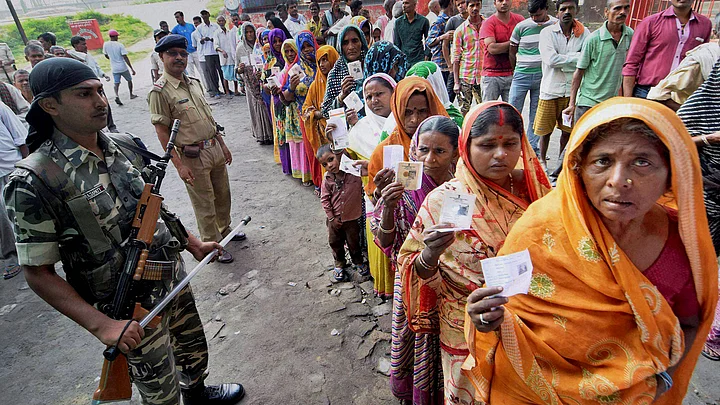As voting in Bihar began today in the first phase of elections, one question which has made leaders of all political hues restless is which way the three Ms – Mahadalits, Most Backward Classes (MBCs) and Mahilas (women) are likely to cast their vote.
The BJP-led NDA, which has steadfastly maintained that it enjoys the confidence of 16 percent Dalits and Mahadalits (as both Ram Vilas Paswan and Jitan Ram Manjhi are their alliance partners), is now willing to re-do its electoral arithmetic as reports pouring in from different places say BJP’s assertion is highly misplaced.
Split in Mahadalit Votes
Much to the amusement of many political pundits, the Mahadalit votes are likely to split vertically, depending on which area the poll takes place.
For example, in the Magadh region, the Mahadalits have rallied around Manjhi but this is not so in the Shahbad region or western Bihar. In areas like Shahpur, Sandesh, Barhara, Brahmpur, Dumraon, and Buxar, the Mahadalits have no inhibitions in expressing their solidarity with Nitish Kumar. This is in sharp contrast to the Mahadalits of Magadh (comprising Gaya, Jehanabad, Makhdumpur, Imamganj and Barachatti), who say, in chaste Maghi (a local dialect), “Jen-ne Manjhi kahiyen, udhre vote de debai (Wherever Manjhi says, we will vote accordingly).”
Things are diametrically opposite in the western Bihar region that borders UP. A labourer in Mohania Sundar Ram says his village near Durgawati was not well connected with Kaimur. “It’s all because of Nitish that a lot of development – sadak, bijli, paani – took place in this nondescript village,” the 40-year-old Mahadalit says. He elaborates at length on how he benefited under several welfare schemes launched by the Nitish government for the oppressed and weaker sections.
Electoral Arithmetic, Not That Simple
- Rainbow alliance of NDA may find itself falling short of the crucial Mahadalit votes
- Reports pouring in indicate a split in Mahadalit votes, with some preferring Nitish to Manjhi
- Voters in Magadh region hail Manjhi blindly while those in western Bihar are vouching for Nitish’s development work
- EBCs constituting more than 30% of the electorate will be a deciding factor in these polls
- Women voters would also decide the fate of these polls as the last one decade has provided them with ample job opportunities
The Other Two Ms
And what about the Most Backward Classes (MBCs), also known as ati pichda (extremely backward class, EBCs)? Travelling from one corner to another in Bihar, one gets a feeling that this backward community, which has been carved out of OBCs, may throw its weight behind the NDA as well as the grand alliance candidates.
It’s more or less settled that upper castes are with NDA. So is a section of Mahadalits. Likewise, Muslims and Yadavs have rallied around the mahagatbandhan. It’s the EBCs who have kept everyone on tenterhooks. The EBCs, which constitute more than 30 per cent of the electorate, could make or mar Nitish and Modi’s prospects.
— A Former Congress Vice President
The third M is Mahila – woman voters – who comprise nearly half of the 6.68 crore electorate. In the last one decade, women in Bihar have got more employment – be it as school teachers or anganwadi sevikas. Of the 3.5 lakh teachers appointed on contract, more than half of them were women. And they have one more reason to cheer as Nitish has made them confirmed staff besides fixing basic pay-scale for them. Another sop for them was an assurance that he would reserve 35 percent seats for women in state government jobs if he was voted to power again.
“In 2014 parliamentary election, I voted for the BJP. Now this time, my vote is for Nitish,” said Pratibha Kumari (name changed on request), a primary school teacher. “Nitishji has given us economic independence. And above all, improved law and order. Now girls pedal their way from school to their home on cycle even in the evening, get school uniform and scholarship. If the girls of my family get benefits, why should I not vote for the present dispensation,” she argued.
Nitish says that enrolment of girls in high schools has gone up from 1.5 lakh in 2005 to 8.5 lakh in 2015. So it is not surprising that this reflects when these girls’ parents, particularly women, cast votes: And they don’t vote for caste.
(The writer is a Bihar-based journalist)
(At The Quint, we question everything. Play an active role in shaping our journalism by becoming a member today.)
